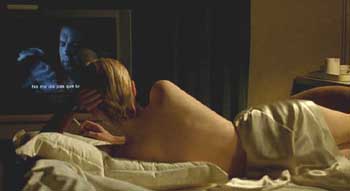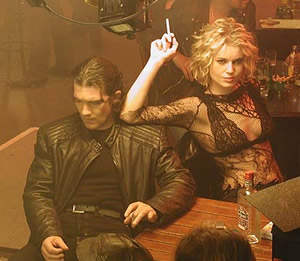|
Dammit, dammit, dammit. Godammit to hell. This is one of those films that taunts you with the idea that it's going to be very clever and involving, and then leaves you going dammit, dammit, dammit by the end. The movie has a lot going for it, which only makes its ultimate failure that much more irritating. 
Laure Ash (Rebecca Romjin-Stamos) is a high-end thief, and like many modern noir females, is willing to sleep with anyone, male or female. The story opens with the audacious theft of a diamond-studded outfit right off of the woman wearing it. In the midst of a film festival, the titular character seduces the wearer of the barely-there outfit and strips off the valuable costume pieces, passing them to a confederate. When she double-crosses her partners, she sets off a chain of events that will ultimately conclude seven years later, involving more plot turns than I could summarize without wasting a few thousand words. No less audacious than the theft is the approach of director Brian De Palma, whose style is extravagant and impossible to ignore, a grand, sweeping reminder that you are watching a movie, a visually-oriented form of storytelling, which he intends to milk for all of its worth whether you're on board or not. There's something admirable about such bold use of technique in a medium so overrun with films whose directors seem ultimately bored with method and present their images in a homogenized, pedestrian manner; we almost forget that there's more exciting ways of doing things. It's unfortunate, then, that such a broad disparity exists herein between how De Palma presents his narrative and the narrative he's decided to present. Where to put and point the camera has never been the man's weakness. I like inventive framing and editing, I like noir, I like surprises. I also like films that don't throw my suspension of disbelief right into the intake of a 747. Hardly a half-assed affair, the film has about three plots going on, all intertwined in varying degrees of efficacy. Out of the three concepts, all rather arch, one is underdeveloped and one is patently ridiculous and feels like a total cheat. There's mistaken identities, there's the specter of the past haunting the present, there's an intricate web of manipulation involving a photographer, Laure, and her politically-rising husband's security rep. There's the thematic subtext of the classic scheming film noir female as a springboard for the examination of regret, love letters to Double Indemnity and Blow up, and a completely unexpected plot twist that will likely leave one shouting "Whoa; what the fuck?" at the screen rather than marvelling at its cleverness. 
This is where appraising the film's merits becomes tricky. Fact is, there is rather a lot of cleverness worth admiring here. Clues are sprinkled throughout in a deft and subtle manner. Details the camera does not focus upon but which cannot help but be noticed take on a clarified sense of meaning in retrospect, and it's a testament to De Palma's directorial skills the way these scenes provide a knowing foreshadowing of what will ultimately be disclosed. The problem is that all this artistry is in the service of hinting at a plot twist which itself is completely stupid. You're not likely to see it coming. Why would you? There's no logical reason why you should. You'd be about as likely to expect the sudden arrival of Batman in the middle of a standard courtroom drama. Of course, I have no trouble buying into the idea of Batman in a Batman movie, which is where this film trips over its aspirations and breaks its neck on the pavement: it completely fails to convince us that it is the kind of film it ultimately turns out to be. Listen to Rebecca Romijn-Stamos deliver the exposition following the twist, and note how she doesn't seem to believe it any more than you likely will. Much that I hoped to like it, Femme Fatale is entirely too much akin to De Palma's follow-up feature, The Black Dahlia-a beautifully-shot mess of a story. You may notice that I've barely said anything about the plot. That's because in the end it hardly matters. The material itself is fine, and there's a good film that could be made from such a premise, the question of whether those iconic, rotten-to-the-core anti-heroines of old were really as amoral as they seemed, or simply couldn't see where their choices were taking them. That good film, however, is still waiting to be made. -review by Matt Murray
|
|
||||||||